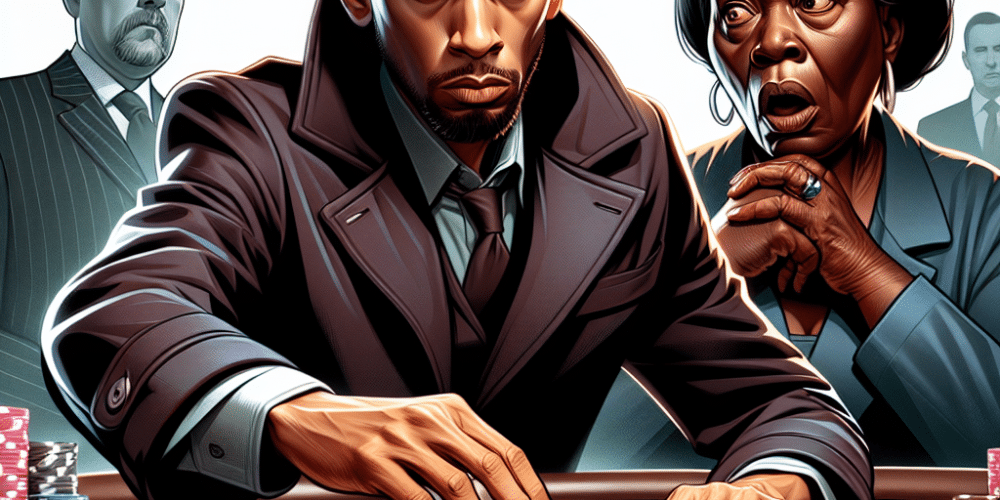During a high-stakes poker tournament held on September 14, 2025, Aaron Barone delivered a jaw-dropping moment that left spectators and fellow competitors buzzing. In a decisive hand against the renowned Ian Simpson, Barone executed a slowroll that not only secured his victory but also sparked widespread discussion across the poker community.
In the early hours of the tournament, Barone and Simpson found themselves heads-up at the final table. As the tension mounted, Barone managed to catch a rare opportunity against Simpson, a player known for his own strategic maneuvers and psychological tactics at the poker table. The slowroll unfolded when Barone took longer than usual to reveal his winning hand, a move that left Simpson momentarily befuddled and the audience on the edge of their seats.
The poker world is no stranger to the occasional slowroll, a controversial tactic where a player with a strong hand pretends uncertainty before revealing their cards. However, Barone’s execution was exceptional, both in its timing and psychological impact. As he slowly turned over his winning hand, a murmur spread through the room, and the seasoned professionals watching couldn’t help but appreciate the nerve and skill of the move.
Barone’s victory came at a time when the poker world has been evolving, with new strategies and personalities continually shaping the competitive landscape. The significance of this match was not lost on the attendees. Many recalled how Ian Simpson himself had previously employed similar tactics to unsettle his opponents. Now, it seemed, he had met his match in Barone, who showed that he could master the mental game just as effectively.
In a post-tournament discussion, one could almost hear Barone thinking: It was all about timing. The slowroll was risky, but the reward was worth the gamble. He appeared unfazed by the potential backlash, instead reveling in the moment and the psychological triumph over a formidable opponent. This was more than just a win for Barone; it was a statement about his place within the echelons of poker strategy.
Critics and supporters alike weighed in on the event, offering varied perspectives on Barone’s slowroll. Some criticized the move as unsportsmanlike and unnecessary, arguing that poker should be about skill and respect rather than mind games. Meanwhile, others applauded Barone’s courage to challenge the norms and use every tool at his disposal to secure the win.
The poker industry has long been known for its vibrant personalities and intense rivalries. As the game continues to attract a global audience, moments like these become focal points for debate on the ethical boundaries of psychological tactics in poker. In the digital age, where poker celebrities gain followings on streaming platforms and social media, the ripples from such events spread further and faster than ever before.
Ian Simpson, known for his charisma and competitive spirit, handled the loss with grace, acknowledging the skillful play by his opponent. It’s part of the game, he seemed to concede, and sometimes tables turn. Known for his ability to read his opponents and make calculated moves, Simpson’s own strategies have often danced on the edge between brilliance and controversy. Yet, this encounter was a reminder that in poker, as in life, there’s always someone ready to outmaneuver you when the stakes are high.
As the poker community dissects the match, analysts highlight how crucial psychological plays can be in high-stakes settings. The slowroll, while contentious, is a testament to the depth of strategy required at the top levels of poker. It’s not just about the cards you’re dealt, but how you play them and the unpredictability you bring to the table.
Looking beyond the immediate drama, Barone’s victory is seen as a moment that encapsulates the current era of poker—a blend of traditional skill and modern psychological warfare. The narrative of the game is evolving, with players like Barone embracing both the heritage and future of poker strategies.
In contrast to those praising Barone’s tactics, there are voices within the community advocating for clearer guidelines on psychological conduct in professional games. They argue for an emphasis on fair play and sportsmanship, suggesting that the excitement of the game should stem from skill rather than manipulation.
Regardless of the opinions, Aaron Barone has secured his place in the annals of poker history with this victory. As the tournament concluded, the discussions about his slowroll continued to resonate, not only as a memorable moment of the event but as a broader commentary on the evolving nature of poker itself.
For enthusiasts and aspiring players, the match offered a lesson in the importance of psychological acumen, the significance of timing, and the ever-present balance between risk and reward. Poker, at its core, remains a game of skill, chance, and the human psyche—where every decision counts and every player brings a unique game to the table. As the poker world continues to grow and change, moments like Barone’s slowroll will remain pivotal in shaping the narratives and legends of the game.

David Garato is a luminary in gaming journalism, renowned for peeling back the curtain on the gaming world with his witty and insightful commentary. A decade into weaving stories from the pixelated edges of indie games to the expansive universes of AAA titles, David’s work is a thrilling blend of analysis and adventure. When not writing, he’s live-streaming, sharing his gaming exploits with an engaged and growing audience. David doesn’t just write about games; he lives them, making him a trusted guide in the gaming community.
















